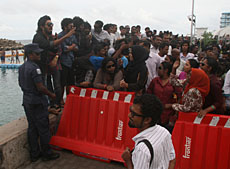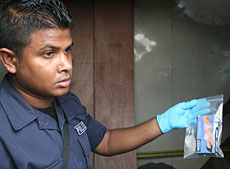Home Minister Dr Ahmed Jameel has blamed a current “surge” in crime partly on the Second Chance rehabilitation programme run by the former government, which he alleged released prisoners, sometimes with “heavy sentences”, for political purposes.
After telling local media this week that over 200 convicted criminals released under the scheme has been returned to prison over allegedly having re-offended, Dr Jameel pledged more former Second Chance inmates deemed or suspected as posing “a danger to the public” would be returned to custody.
The now-defunct Second Chance initiative has received significant media coverage this week after a former inmate released under the programme, 29 year-old male Ahmed Murrath, confessed to the murder of prominent lawyer Ahmed Najeeb in Male’.
However, the former manager of the initiative, Aishath Rasheed, has claimed she was surprised at reports of a large number of inmates released under Second Chance now being returned to prison. Speaking to Minivan News this week, Rasheed raised concerns about a lack of rehabilitation measures for young people imprisoned for smaller offences such as drug use in the country since the Second Chance programme was terminated.
Second Chance was established to help address concerns that a majority of the Maldives’ prison population were young people incarcerated for minor drug offences. Rasheed has maintained that the resulting long jail terms handed to young people – in some cases even over minor drugs offences – “were destroying their lives”.
According to the UNDP’s “Prison Assessment and Proposed Rehabilitation and Reintegration of Offenders Report”, which was published last year, 66 percent of all prisoners in the Maldives at the time of report were in jail for drug use or possession, often small quantities.
The majority were males under 30 years of age with education below O-levels, the report added, claiming the Maldivian prison population could be reduced by up to two-thirds if the government would “de-criminalise the offence of drug usage and propose mandatory rehabilitation”.
“Political advantage”
Home Minister Jameel has contended that the Second Chance initiative had been set up by former President Mohamed Nasheed “without a legal basis or justification”, in an attempt to pick and choose convicts for release on the basis of their political allegiance.
“Nothing prevents me to take back to prison all those released under the Second Chance programme found committing further offences for the safety and security of our people,” he said. “I have abolished Second Chance after assuming this [Home Ministry] portfolio to prevent ‘undue political advantage by convicts in the correctional system’ which was the policy of the Nasheed Government. I intend to take back all dangerous criminals back to prison as part of process to make our home and streets safe.”
Jameel added that the country’s legal system already included mechanisms by which prisoners could obtain early release under certain circumstances. He claimed these legal mechanisms had been negated by the Second Chance initiative.
The mechanisms include clemency, which was provided under the Law on Reduction of Punishment and Clemency and considered only under “exceptional circumstances”, according to Jameel. He added that applicants for this mechanism were required to be reviewed by a specially established clemency board.
A second method to obtain early release is provided in the form of a parole programme overseen by a multi-sectoral board that decides on the eligibility of each candidate.
“Both of these programmes were abandoned to directly pick and select convicts from prison for Second Chance,” claimed Jameel. “Indiscriminate release of convicts without regard to the nature of the offences and selecting convicts based on their political association and belief demonstrates the underlying purpose of the Second Chance programme. Not only one or two of those released has been caught again for committing further offences, but several arrests made to regards to serious offences found second chance convicts.”
When contacted by Minivan News about the number of prisoners released under Second Chance that had since been returned to custody, the Maldives Police Service said it could not confirm a figure at the time, forwarding the enquiry to Home Minster Jameel.
The home minister said that “more than 200” people released under the programme were believed to have re-offended.
The Second Chance programme was stopped back in February directly following the controversial transfer of power that brought Dr Mohamed Waheed Hassan’s coalition government to power.
The Home Minister claimed back in March that a total of 1879 criminals were incarcerated for various offences during Nasheed’s term, but only 621 remained in prisons while 1258 have been released with no clear procedure.
After shutting down Second Chance in February, the programme’s responsibilities were instead tasked to the Parole Board and Clemency Board, which were re-formed in the intervening weeks.
However, both boards have been criticised in recent years for being “slow and ineffective”, by Second Chance’s former manager Aishath Rasheed, who claimed to be “very much surprised” about reports of the number of prisoners released under the programme now being returned to jail.
An estimated 439 inmates were released during the life-time of the Second Chance imitative, each of whom were said to be thoroughly evaluated and approved by the courts, according to Rasheed. Any former inmate found to have violated the terms of the release were sent back to the prison to complete their jail term. She added that the 439 inmates released under the scheme were mostly young people held on minor drug offences.
Verification
Rasheed, also a former member of the country’s parole board until resigning after the new government came to power, claimed that she had first heard about possible cases of prisoners released under the Second Chance committing criminal acts back in March. She stressed that it was therefore important to verify whether the suspected offenders were in fact released under the scheme and if they had been guilty of re-offending.
Beyond serving to secure an early conditional release for prisoners, Rasheed stressed that the programme was also designed to provide educational and rehabilitation programmes for inmates – initiatives that she claimed were not being provided at present.
“The idea was to give a chance to everyone in prison for rehabilitation, but the programme has been stopped, we had offered O-level training and spiritual classes,” she said. “However, within two days of Second Chance being finished they have stopped the O-level programmes and the yoga and spiritual classes. We had very technical and experienced instructors for these programmes, but I’m not sure they have been replaced by anything.”
Rasheed claimed that in closing down the programme, Home Minister Jameel had not looked at the programme and its respective benefits – a model used in many other countries to rehabilitate prisoners.
“In Singapore and New Zealand for example, there are very productive Second Chance-style programmes,” she said. “Due to the structure of our Department of Penitentiary and Rehabilitation Service (DPRS) we were only just starting out with these type of rehabilitation programmes.”
Speaking to Minivan News in March, Rasheed claimed that the Parole and Clemency board “did not have the technical expertise to continue the program”.
“I was a member of the parole board. Both boards exist as mere names. Some members do go for the meetings but have to go back home because the meetings cannot be held due to lack of quorum,” Rasheed said at the time.
However, as of last month, a new parole board set up by President Waheed had begun assessing the eligibility of inmates for release after they had undergone months of rehabilitation programmes.
Parole and rehabilitation
Present Parole Board member and Spokesperson for the Department of Penitentiary and Rehabilitation Service (DPRS) Bilal said that although the Second Chance programme had been terminated in February, prisoners would be still be eligible for potential parole and rehabilitation.
“The present government decided not to continue with Second Chance, there have been examples where prisoners had violated the conditions of their release and had been returned [to jail],” he said. “Second Chance as a programme was seen as a failure.”
Bilal claimed that the main functions of the Second Chance programme could still be met through the existing parole programme ran through the DRPS.
“Under parole, a prisoner under 25 for example must serve one third of their sentence, the parole board will then decide on the candidate’s release,” he said.
As of next month, Bilal claimed that a reintegration programme was being launched to help prisoners released on parole to acclimatise to life outside of prison for their first month back in society. Vocational programmes in fields like electrical maintenance were also said by Bilal to currently be on offer at the detention centres of Maafushi and Dhoonidhoo.
“We have planned to start basic education programmes soon as well as more advanced O-level courses. We are having meetings today with the Education Ministry on this,” he claimed. “We expect these programmes to be starting soon.”
Rehabilitative focus
Back in May, Lubna Mohamed Zahir Hussain, Minister of State for Health and Family saidthe upcoming establishment of a entirely new drug court in the country was indicative of a major shift in ongoing government policy over the last three years from a solely punitive approach to a more rehabilitative focus for minor offenders.
The Health Ministry insisted at the time that the new regulations provided distinct measures to assist small time drug abusers, while cracking down on larger-scale traffickers based in the Maldives and the wider South Asian region.
Hussain claimed that under this new legal and judicial system, the NDA was now looking to focus to rehabilitate prisoners found guilty of minor drug offences – something that had not been possible through the prison service previously.
“Seventy percent of prisoners currently being held in jails on drug offences have never been given treatment whilst they are incarcerated,” she claimed at the time.
Hussain added that recent amendments to national drug laws would compensate for the loss of rehabilitative programmes such as Second Chance – at least for minor drug offenders.
“The essence of the Second Chance programme is seen in the new drug law,” she said at the time.
Prison fears
Ali Adyb of the Journey NGO, which runs a drop-in centre in Male’ as well as outreach programmes across the country’s many atolls, told Minivan News earlier this year that he believed a long-term policy of criminalising drug users in the Maldives had failed, in part, because of a failure to segregate prisoners convicted of petty theft with more serious crimes.
“We are aware of people who have actually become addicted to drugs whilst in jail here,” he said.
Journey stressed that even for convicted addicts who were no longer being held in the country’s prison system, the stigma of having a criminal record for using narcotics led even qualified people to struggle to find a job upon their release.




